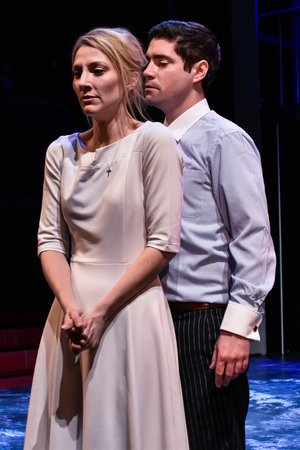Review: Weirdness Yields Insight in Masterly MEASURE FOR MEASURE at Chesapeake Shakespeare Company

Only a line or two into Chesapeake Shakespeare Company's new production of Measure for Measure, one begins to appreciate director Lise Bruneau's skill. There are no explanations why yet, but Vienna's Duke Vincentio (Ron Heneghan) is departing his duchy in haste. How does one evince haste? Not simply by saying one is in haste. Indeed, though I'm sure it's often done, standing still and saying one is in haste would kill the impression Shakespeare is out to convey. None of that here; instead, Vincentio multitasks, simultaneously checking manila folders of documents, stuffing some of them in a briefcase, fumbling with a cellphone, and distractedly not paying full attention to the act of speaking or the content of what he says. Bruneau can evidently accomplish a lot with stage business.
Another example, in the following two scenes: what's done with litter. Something is being neglected in the Vienna the Duke has seemingly abandoned; we're learning this in various ways, but two or three of the characters in a street scene also casually toss plastic cups and other trash to the ground as conversations proceed, a telling metaphor for an insufficiently-governed society. And then, something countervailing: along comes Friar Peter (Michael Crowley), also multitasking: conversing with the Duke but all the while inconspicuously picking up the trash from the street too. From this we know that there are still people tending to the neglected commonwealth - and that the Duke is secretly one of them.
But of course it's not just the stage business: it's the intelligent line readings, the blocking, the costumes. With this play, an audience needs all the help it can get. On the surface, it looks simple enough. We can figure out what's happening. But what on earth does it all mean? We've entered a universe with weird moral norms: where fornication is appropriately a hanging offense (although actual hanging is somehow unacceptable), where one's chastity is rightly valued above a sibling's survival, where sexual relations entered into under false pretenses establish not only the existence but the rightness of a marriage; where a layman's posing as a friar and hearing confessions, far from being a blasphemous breach of trust, is apparently praiseworthy. And then we are supposed to navigate the generation of moral dilemmas based on these bizarre premises. Yes, we will end up needing some guidance.
And guidance we receive. Uncannily, under the cumulative effect of the touches in this production, it all starts to make sense. If we buy into the norms, the dilemmas are reasonable and elegantly presented. I found myself (and I'm sure I wasn't alone), gaining much more respect for the play.
For one thing, if we can climb beyond the foothills of the weird norms of the dramatic universe, we can take in how marvelously has Shakespeare anticipated some issues we must confront today. Showing us the Duke's deputy Angelo (Séamus Miller) telling novice nun Isabella (Amanda Forstrom) that he will save her brother Claudio (J. Bradley Bowers) from the executioner, but as a certain contemporary leader would put it, he "needs a favor from her, though," or showing us Angelo defending himself from public accusations of sexual harassment by pleading a good reputation we know is maintained only by threats, conspiracy theories, and spurious claims about his accusers, or showing us Angelo getting his way (he thinks) by making promises he has no intention of keeping, Shakespeare conducts us to very familiar territory.
Shakespeare also has a very modern, very Brechtian sense of the interconnection of the worlds of "the quality" as the British would call them (the posh people at the top of society) and the demimonde of pimps and prostitutes, drunks and criminals. The lowlifes get almost equal time with their notional betters in this show. There's Mistress Overdone (Anna DiGiovanni), a madam, Pompey (Terrance Fleming), Overdone's pimp and tapster, executiomer Abhorson (David Hanauer), and the too-drunk-to-execute criminal Barnardine (Kathryne Daniels). There's the Provost (Dawn Thomas Reidy), whose custodianship of the prison and empathy for the prisoners puts her centrally in their demimonde whether she comes from it or not. And there are two customers of Mistress Overdone who seem to be gentlemen gone slumming, who lament along with the sex workers and their management when Angelo goes after the town's brothels. These groups need each other. The posh folk need the demimonde, and vice versa. It's symbiotic and mutually beneficial.
But there is a line separating this mutually beneficial interchange from Angelo's behavior towards Isabella. The latter is Shakespeare showing us the connections among sexual puritanism, power, repression, and sexual hypocrisy. To be fair to Angelo, to go by the script, there's no indication he's done this exact sort of thing before (though he has earlier abominably treated his fiancée Mariana (Anna DiGiovanni again)); he seems not to have been a serial offender -- yet. And to be fair to puritanism, Isabella seems as puritanical as Angelo first believes himself, and then pretends himself, to be. As I've already acknowledged, Isabella's moral convictions are, in the universe of the play, legitimate and praiseworthy, even or maybe especially when carried to the extremes of Isabella letting her brother die rather than compromise them. But even without firm evidence in the script, one senses that Shakespeare knows the more usual course, which is that offenders like Angelo are generally serial offenders. And Angelo's misuse of his power is surely both a political and a sexual issue. Not for nothing does Isabella chide: "O, it is excellent/ To have a giant's strength; but it is tyrannous/ To use it like a giant." This is about power more than sex.
So part of the play's appeal is the insight it affords us into issues that are very much with us. And probably in consequence, there seems nothing strained in doing it in modern dress. It works in a way that the near-modern dress (World War I era) production of Chesapeake Shakespeare Company's Richard III of a few years ago never did. And what great costumes, by Sandra Spence, from a coxcomb's coat of many colors for Lucio (Jonas David Grey), a braggart who is spectacularly unlucky in whom he chooses to slander, to a bike delivery uniform for a Messenger (Christopher Bennett), to luscious pink outfit that could have come from Legally Blonde for Mariana, to a gold pimp's jacket for Pompey, to nuns' and friars' habits.
But certainly the show's principal strength is in its performers. CSC has spent years polishing its ensemble, and has built a reliable company, supplemented by a stable of on-call talent, and they are now on a par with any other professional ensemble in town. To single out a few I've commented favorably on in other plays, Ron Heneghan takes the Duke, one of the most demanding roles in Shakespeare (nearly a third of the total lines in the play), and makes every step of it seem reasonable and appealing - and not a heavy lift. Séamus Miller has transitioned from a boyish Prince Hal last season to a still-boyish but now corrupted villain in Angelo. Kathryne Daniels was a definite and deserved crowd favorite as Barnardine, adding to a drunken gait a layer of punkish unpredictability and a periodic descent into a guttural voice that kept everyone in stitches.
I should say a particular word about the characterization that is provided by newcomer Amanda Forstrom as Isabella - and I'm pretty sure the characterization is a choice by the director - to present her as beautiful but conducting no erotic charge, down to her being dressed all in virginal white. This means that Angelo's eroticized response to her is utterly unsought, entirely a matter of whatever strange dynamics are roiling his head, which is consistent with our understanding of how these things actually work. The audience can see that the defense so often resorted to by harassers that she had somehow provoked his misbehavior is absurd. (It does raise some question about how to comprehend the Duke's sudden proposal to her at the end, and her acceptance, which both come out of left field, and necessarily entail an abandonment of her devotion to virginity - but, hey, this is a Shakespeare comedy, and people have to get married at the end.)
Before I sign off, let me address one other problem in the play, the so-called "bed trick" that turns the tables on Angelo and gives context to the play's title. Shakespeare can't quite make the trick (having Angelo have sex in the dark with Mariana, when he believes he's debauching Isabella) work thematically. Making the outcome of the trick, i.e. "measure" of forcing Angelo's marriage to the woman he actually bedded the punishment for Angelo's "measure" of having tried to extort sex from Isabella, hardly seems like according a fair value to either Angelo or Mariana. Marriage shouldn't be a penalty to be inflicted; it loses most of its meaning under such a circumstance - and Shakespeare, who frequently enough depicts the giddy wonder of love, must have known this. It is antithetical not only to what Shakespeare knew, but to what he's trying to tell us here. Love can't properly be forced on anyone any more than sex can. The other parts of the weird moral universe I mentioned at the outset at least work in synch with the story Shakespeare builds on them. This one doesn't. And for that reason, if no other, this play does not quite reach the highest level of Shakespeare's oeuvre.
Still, from soup (the direction) to nuts (the acting) and everything in between, this was a terrific production. Highly recommended.
Measure for Measure, by William Shakespeare, directed by Lise Bruneau, through February 23 at at Chesapeake Shakespeare Company Theatre, 7 South Calvert Street, Baltimore, MD 21202. Tickets $19 to $53, at ChesapeakeShakespeare.com or 410-244-8570. Adult behavior and subject matter, extreme intoxication, onstage evidence of offstage bloodshed.
Photo Credit: Brandon W. Vernon.
Reader Reviews

Videos
